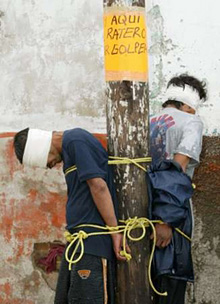 |
 |
 |
 Editorials | December 2006 Editorials | December 2006  
Mexico's Politics
 Greg Flakus - VOAnews.com Greg Flakus - VOAnews.com


| | Two suspected thieves are tied to a lamp post after being caught by members of the Popular Assembly of the People of Oaxaca, who said they had stolen a cell phone and money from an old lady, in Oaxaca September, 2006. The sign reads 'Here are thieves, hit them'. (Reuters) |
After being sworn in before the Mexican Congress amid both cheers and boos, Mexico's new president - Felipe Calderon - has taken bold steps to move forward with his proposals. The country remains bitterly divided and, in some places, there could even be violent reaction to his plans.

Felipe Calderon spoke the oath of office with his right hand outstretched before a joint session of the Mexican Congress, as called for in the constitution. Members of his own National Action Party, or PAN, cheered and applauded, while members of the leftist opposition, in particular the Party of the Democratic Revolution, or P.R.D., booed and hissed. The whole ceremony was over in about four minutes, but it carried great political symbolism.

Leftist Opposition

The P.R.D. and other leftist parties, responding to a call from their defeated presidential candidate, Andres Manuel Lopez Obrador, had threatened to block the ceremony and, by doing so, create a constitutional crisis. At the very least, they hoped to mar the occasion so that the new president would enter under a cloud of uncertainty and weakness. By coming in the back door behind the podium in the House of Deputies, outgoing President Vicente Fox at his side, the new president showed that he would not be cowed by such threats.

Lopez Obrador claims Calderon defeated him by less than a percentage point in the July second election through massive fraud. The Federal Electoral Tribunal, however, examined the evidence presented by the P.R.D. and rejected that claim. Support for Lopez Obrador waned in the months following the election when his supporters blocked Mexico City's main thoroughfare and groups linked to the P.R.D. in the southern state of Oaxaca burned buildings and vehicles as part of a political fight with the local governor.

Recent surveys show 85 percent of Mexicans accept Calderon as the new president, even though Lopez Obrador has proclaimed himself the so-called "legitimate president."

But Lopez Obrador's hardcore support still includes millions of Mexicans. There are also millions of others who voted for the Institutional Revolutionary Party, or PRI the party that controlled Mexico for 71 years without interruption until Vicente Fox was elected in 2000. Having been elected with only a little more than a third of the total vote, Calderon sees the need to reach out to his opponents.

Calderon's Agenda

At the start of his first full week in office, on December 4, President Calderon borrowed an idea that had been proposed by Lopez Obrador, cutting the salaries of top officials, including his own, by 10 percent. Lopez Obrador attacked the move as insufficient. He chided the news media for playing up the salary cut in large headlines and he referred to Calderon as the "spurious president."

But Calderon showed no sign of hesitancy in pursuing his course. Later that same day, federal police agents arrested Flavio Sosa and other members of the coordinating organization that carried out the violent protests in Oaxaca. The P.R.D. claims Sosa as a member and has promised to pay his legal costs.

But the Calderon administration also sees the need to resolve the conflict peacefully and has opened a dialog with protest groups.

President Calderon has also promised to take on some of the most well-funded and violent groups in his country, the drug traffickers. He has called on his national security team to come up with an effective plan to fight organized crime.

Texas Governor Rick Perry, who attended the inauguration, applauded the new Mexican president's tough stance on crime.

"You cannot have economic prosperity, nor continue to make economic progress, if you do not have the rule of law governing your people and a sound legal system and, particularly, an environment where men and women feel safe in their own homes or going on vacation or traveling back and forth across the border. And the border region between Texas and Mexico is not as safe as we want to see it," said Perry.

High Expectations

Mexico City-based political analyst Ana Maria Salazar says the Calderon team is going to have to do a better job than did the Fox team.

"They are going to have to start addressing not only the problem of organized crime and the violence that has developed because of the fights between the drug-trafficking organizations, but also other types of social conflict and violence, like what is going on in Oaxaca, and they are going to have to start solving these problems from the very beginning. They are not going to be able to ignore these problems the way President Fox did," says Salazar.

President Calderon has given his attorney general and other security team members 90 days to come up with a plan to take on organized crime and to reform the criminal justice system in Mexico.

Calderon's moves to crackdown on political violence have met with approval, but they also involve great risk. Oaxaca remains a tense battleground that could explode again unless the underlying problems there are resolved. | 
 | |
 |



